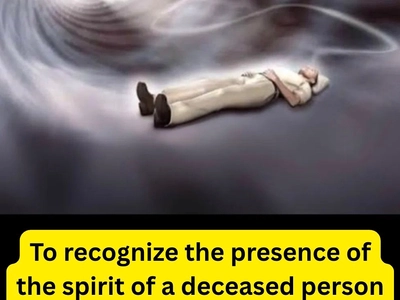The Difference Between the Spirit of a Loved One and Other Forces
When someone close to us dies, life changes forever. The silence that follows can feel heavy, and the heart often longs to sense them again. Many people say they have experienced moments when they felt their loved one’s presence. This might happen in many ways: a soft touch on the shoulder when no one is there, the sudden smell of a familiar perfume, or even an overwhelming wave of peace in a quiet moment.
These experiences can feel mysterious, comforting, or sometimes even unsettling. The big question is: are we truly sensing the spirit of a loved one, or could it be something else?
For thousands of years, cultures all around the world have shared stories about spirits, ancestors, and energies that linger after death. Some experiences feel like gifts of comfort, while others may create fear or confusion. Understanding the difference between these two types of encounters can bring clarity and peace of mind.
This article will gently guide you through different signs, feelings, and patterns that can help you recognize when a loved one may be near—and when another kind of energy could be involved. It will also explore ways to respond, how to protect yourself, and why trusting your intuition is one of the most powerful tools you have.
1. The Energy They Carry
The first way to recognize whether a spirit is your loved one is by paying attention to the energy you feel.
When a loved one visits, their presence usually feels familiar. It is often described as warm, calm, and soothing. Imagine the comfort of a gentle hug, the feeling of someone sitting beside you in silence, or a reminder that you are not alone in your grief. Many people report that the air feels lighter, or their emotions shift toward peace. Sometimes it feels like love itself is wrapping around you.
On the other hand, other forces may carry a very different kind of energy. You might feel chills run down your spine, a sudden sense of unease, or even fear. Instead of warmth, there may be coldness. Instead of peace, there may be anxiety.
It is important to notice these differences. A loving spirit will not want to harm you or scare you. If what you feel leaves you unsettled, restless, or drained, it may not be your loved one reaching out at all.
Real-Life Example
A woman who lost her grandmother said that every now and then, she feels a calming presence in her kitchen, where her grandmother often cooked. She smells fresh-baked bread even though nothing is in the oven. Each time this happens, she feels safe, as though her grandmother is still guiding her.
Another person described hearing knocking noises at night that grew louder and more chaotic. Instead of comfort, it brought fear and sleepless nights. This was likely not the gentle presence of a loved one but another kind of energy.
2. The Nature of the Signs
When spirits of loved ones connect with us, they tend to use personal signs that carry meaning between you and them. These signs are usually gentle, subtle, and deeply connected to your shared memories.
For example:
- Smelling your father’s favorite aftershave when no one is nearby.
- Hearing a special song play on the radio exactly when you were thinking about your spouse.
- Finding small objects connected to them, like coins, feathers, or meaningful items appearing in unusual places.
- Seeing a picture frame slightly tilted as if someone touched it—especially if it holds a photo of your loved one.
These moments are not random. They feel intentional, personal, and filled with love. They remind you of the bond you shared.
Other forces, however, may create signs that feel chaotic, confusing, or meaningless. Strange noises, shadows moving without reason, or objects shifting violently are often disconnected from your personal story. They may leave you wondering, “Why is this happening?” instead of feeling comforted.
A Closer Look at Common Signs
- Dreams: Many people report vivid dreams where a loved one visits. These dreams often stand out from ordinary dreams—they feel real, and the message is clear. In contrast, unsettling dreams with fear, chaos, or strange imagery are less likely to be a loved one.
- Animals and Nature: Some believe loved ones use nature to reach out—like butterflies, birds, or rainbows appearing at meaningful moments. If the timing feels too perfect to be random, it may be a gentle sign.
- Technology: Loved ones sometimes influence phones, radios, or lights. For instance, a phone may light up without cause, or a favorite song may play at just the right time.
3. The Emotional Impact
One of the strongest ways to tell the difference is by noticing your emotions afterward.
When a loved one’s spirit visits, people often describe feelings of healing. Tears may flow, but they are often tears of relief, gratitude, or joy. These experiences can bring closure, reminding us that love continues even after death. Many describe these encounters as sacred moments that help them move forward in life.
By contrast, when an energy that is not connected to your loved one shows up, the emotional impact is very different. Instead of feeling healed, you may feel heavy, anxious, or even frightened. Some people feel drained of energy, as though something has taken rather than given.
A simple rule of thumb is this: love uplifts, fear weakens. If you walk away from the experience feeling peaceful and comforted, it was likely your loved one. If you feel unsettled, restless, or fearful, it was probably not.
4. Timing and Context
Another helpful clue is the timing of the encounter. Spirits of loved ones usually visit during meaningful moments in your life.
They might appear around:
- Birthdays, anniversaries, or special dates connected to them.
- Holidays when family gatherings feel emptier without them.
- Times of emotional need—moments when you are struggling, grieving, or facing big decisions.
These visits feel intentional, almost as though your loved one is saying, “I am still here. You are not alone.”
Other energies, however, may show up suddenly, at random times, with no clear reason. Their presence often feels disruptive, confusing, or poorly timed. This difference in timing can help you tell one from the other.
5. How to Respond
If you believe your loved one is reaching out, responding with love and gratitude can strengthen the bond.
Here are some gentle ways to respond:
- Light a candle in their memory.
- Speak to them aloud or in your heart, thanking them for being near.
- Say a prayer or recite words that were meaningful to them.
- Create a ritual, such as writing them a letter or keeping a memory box.
These actions show openness and appreciation. They can deepen your sense of connection and bring peace.
If, however, you feel that the presence is unsettling or comes from another source, it is important to set boundaries. Protecting yourself is an act of self-care.
Ways to protect yourself include:
- Surrounding yourself with positive affirmations.
- Calling upon your faith or spiritual beliefs for protection.
- Cleansing your space with rituals such as burning sage, using incense, or simply opening windows to let in fresh air and light.
- Visualizing yourself surrounded by a bubble of light or love.
These practices can help shift the energy and restore calm.
6. Trusting Your Intuition
Perhaps the most important guide of all is your own intuition.
Human intuition is powerful. Deep down, most of us can sense whether an experience is comforting or unsettling. When your heart tells you that the presence feels like love, peace, and familiarity, it is probably your loved one. When your instincts warn you of fear, confusion, or negativity, it may be something else.
Learning to trust yourself takes practice. Some people keep a journal of their experiences, writing down when they felt a presence and how it made them feel. Over time, patterns often appear, and intuition grows stronger.
7. The Universal Nature of These Experiences
It is important to know that you are not alone. People across all cultures and religions have shared similar experiences for thousands of years.
- In many Native traditions, ancestors are believed to walk alongside the living, guiding them with signs in nature.
- In Christian traditions, loved ones are sometimes thought to act as “guardian angels,” watching over those they left behind.
- In Eastern cultures, such as in Japan or China, honoring ancestors through rituals is a way of staying connected, and visits from their spirits are often seen as blessings.
- In modern times, countless people share their stories online or in support groups, finding comfort in knowing others have felt the same.
These shared experiences remind us that love and connection do not end with physical death.
8. Why These Encounters Matter
The experience of sensing a loved one is not just about curiosity—it can deeply affect healing and grief. For many, such encounters:
- Bring comfort during lonely nights.
- Provide reassurance that love is eternal.
- Offer guidance during times of decision.
- Create a sense of spiritual connection beyond the physical world.
On the other hand, learning how to recognize and respond to unsettling energies is equally important. It allows you to protect your well-being and keep your healing journey safe.
9. Moving Forward with Balance
Grief is never simple. Some days are heavy, others lighter. Feeling the presence of loved ones can be part of that journey. By understanding the differences between loving visits and unsettling energies, you can move forward with greater balance.
Remember these guiding points:
- Notice the energy. Does it bring comfort or fear?
- Look at the signs. Are they personal and meaningful or random and chaotic?
- Feel your emotions. Do they uplift you or drain you?
- Consider the timing. Does it happen during meaningful moments or without reason?
- Respond with care. Show gratitude for loved ones, and set boundaries for anything else.
- Trust yourself. Intuition rarely lies.
Final Thoughts
Love has a way of crossing boundaries, even the boundary of death. The presence of a loved one may come in whispers, touches, dreams, or signs, but it always carries warmth and peace. By learning to recognize the difference between love and fear, you give yourself the gift of clarity.
In the end, the bond between you and those you love does not disappear. It transforms. It continues in memories, in signs, and in the quiet strength you feel when you know they are still with you in spirit.






